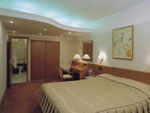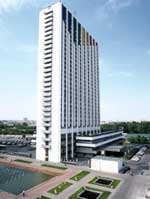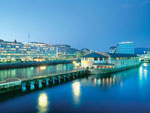The history of the Maly Theatre in Moscow goes back to the headstreams of a theatrical art in Russia, by analogy with the history of the Bolshoi Theatre which is nearby. Today, the Maly Theatre is one of leading drama temples of the Melpomene. It all started with the formation of a student theatre troupe under the Moscow University.
On 30 August 1756 the Great Empress Elizabeth Petrovna issued the Decree On the establishment of Russian theatre. At first, the theatre existed under the University, and then it moved to Petrovsky Theatre, a soon-to-be the Bolshoi Theatre. After a fire of the 1812 the theatrical troupe lost the premises.
In 1824 the architect Joseph Bové re-built Vargin’s mansion next to the Bolshoi Theatre. This is where the drama part of troupe was allocated, and a year later when Bolshoi Theatre was reconstructed, it hosted opera and ballet performers. And the title of theatres has gone because of initial distinction in the dimensions of buildings therefore they and are called the Bolshoi ( big) and the Maly ( small). The first performance took place here on 14 October 1824 when the theatre was opened by Alexey Verstovsky's Lily of Narbonne.
The 19th century generally became the Golden Age in history of the Maly Theatre: it staged works of outstanding Russian poet Pushkin while he was alive, also actors played in Griboedov's comedy Grief from Mind that was displayed in the original version and without censorship, the theatre saw the staging of Revizor and Dead Souls by Gogol. It did not take long for the Maly Theatre to become the leading drama theatre of not only Moscow but also Russia as a whole. In addition to Russian classics it also staged plays of Shakespeare and Schiller.
Alexander Nikolaevich Ostrovsky takes special place in the Maly Theatre’s history. His plays considerably differed from common theatrical trends of that time: they had roots of realism, when every actor was equally important. Ostrovsky wrote 48 plays for the Maly Theatre of 48 plays, and theatre repertoire always includes at least some of them from year to year. It is worth mentioning that sometimes Ostrovsky wrote one actor plays and actively participated in rehearsals, made friends with theatre actors. Today the theatre also has an unofficial nickname Ostrovsky’s House.
For the theatre, the 20th century became the age of shocks, stagnation and revival. In 1898 the part of the troupe led by the producer Lensky left the theatre to establish New Theatre. But in 1907 this branch dissolved. After Great October Revolution of 1917 the Maly Theatre faced the danger of extinction since it was percepted as the object of bourgeois culture. However, the theatre managed to survive due to efforts of some outstanding figures. At the time of birth and death of various innovative reformatory theatres, the Maly Theatre adhered to its traditions and perhaps, managed to protect its interest due to such a strong position. After the Great World War the theatre premises underwent total renovation. The second half of 20th century was a stagnation period not only for the Maly Theatre but for the whole country.
Those times passed, and today the Maly Theatre is still adhering to its traditions that have already became classical. Just as before, it stages Ostrovsky's plays, the repertoire also included Chekhov's works that were not very favoured inter vivos. The foreign classics are also very popular.
Furthermore, for last years the Maly Theatre expanded its tour geography: basically it is Europe and East Asia. To be noted, the theatre not only goes on tours, but also holds festivals that draw not only theatres of Russia but also the countries where Russian classics are staged. After all, The Maly Theatre’s stage is the oldest drama stage of Russia.
Today, the Maly Theatre has the status of national property of Russia along with Bolshoi Theatre, the Hermitage, Tretjakovsky Gallery and St. Basil’s Cathedral. The Maly Theatre is a symbol of a drama theatrical art.







